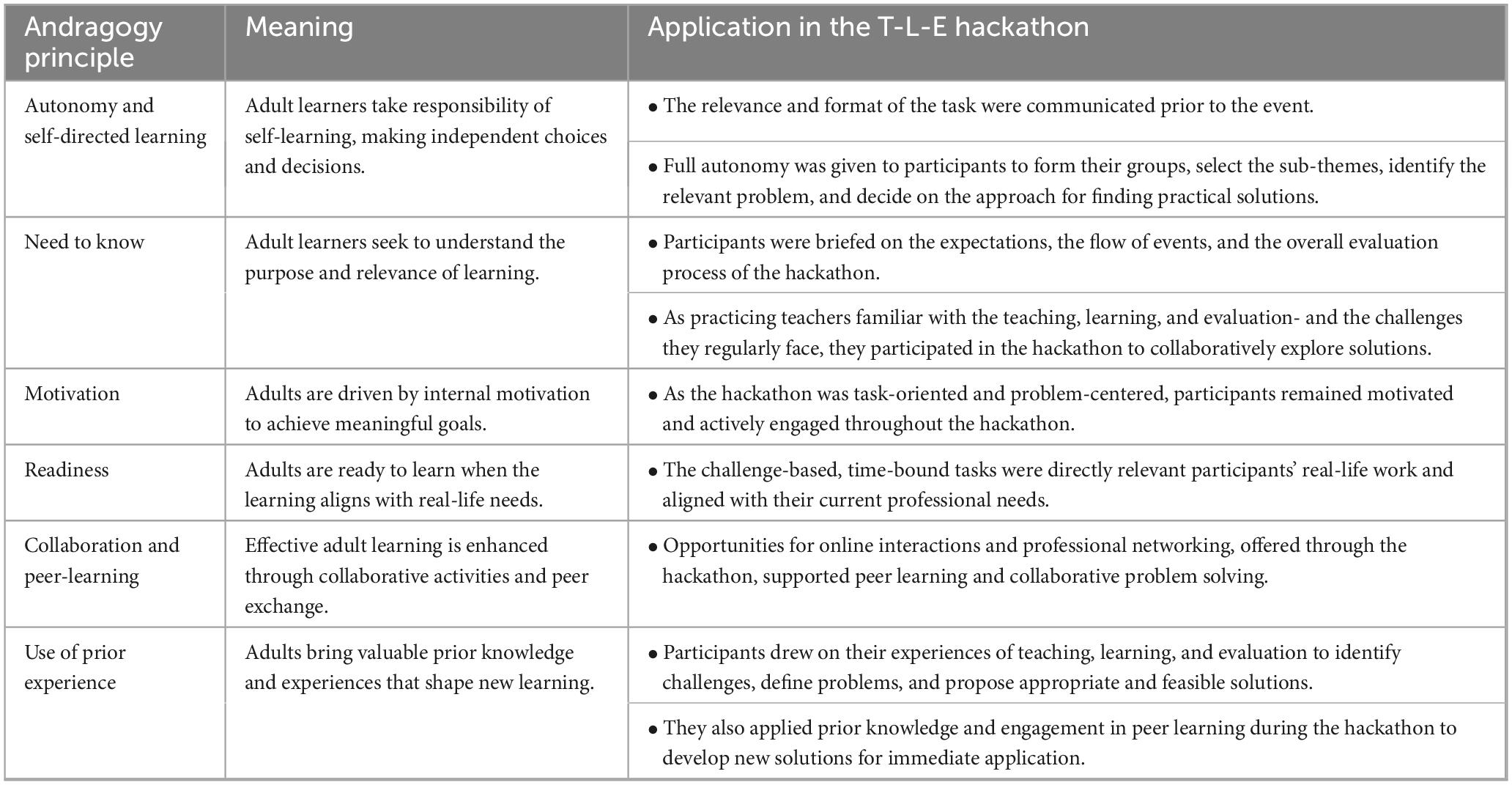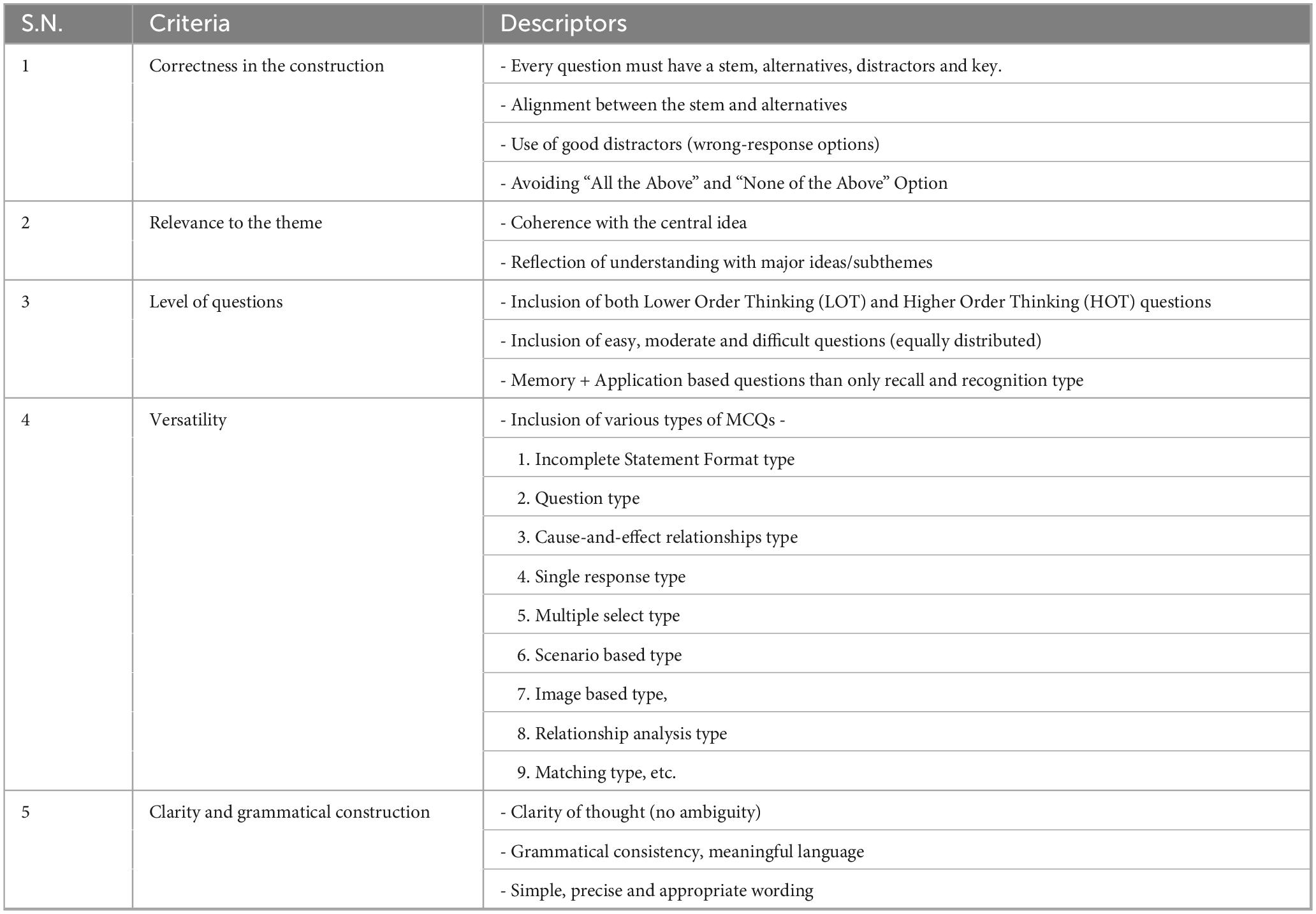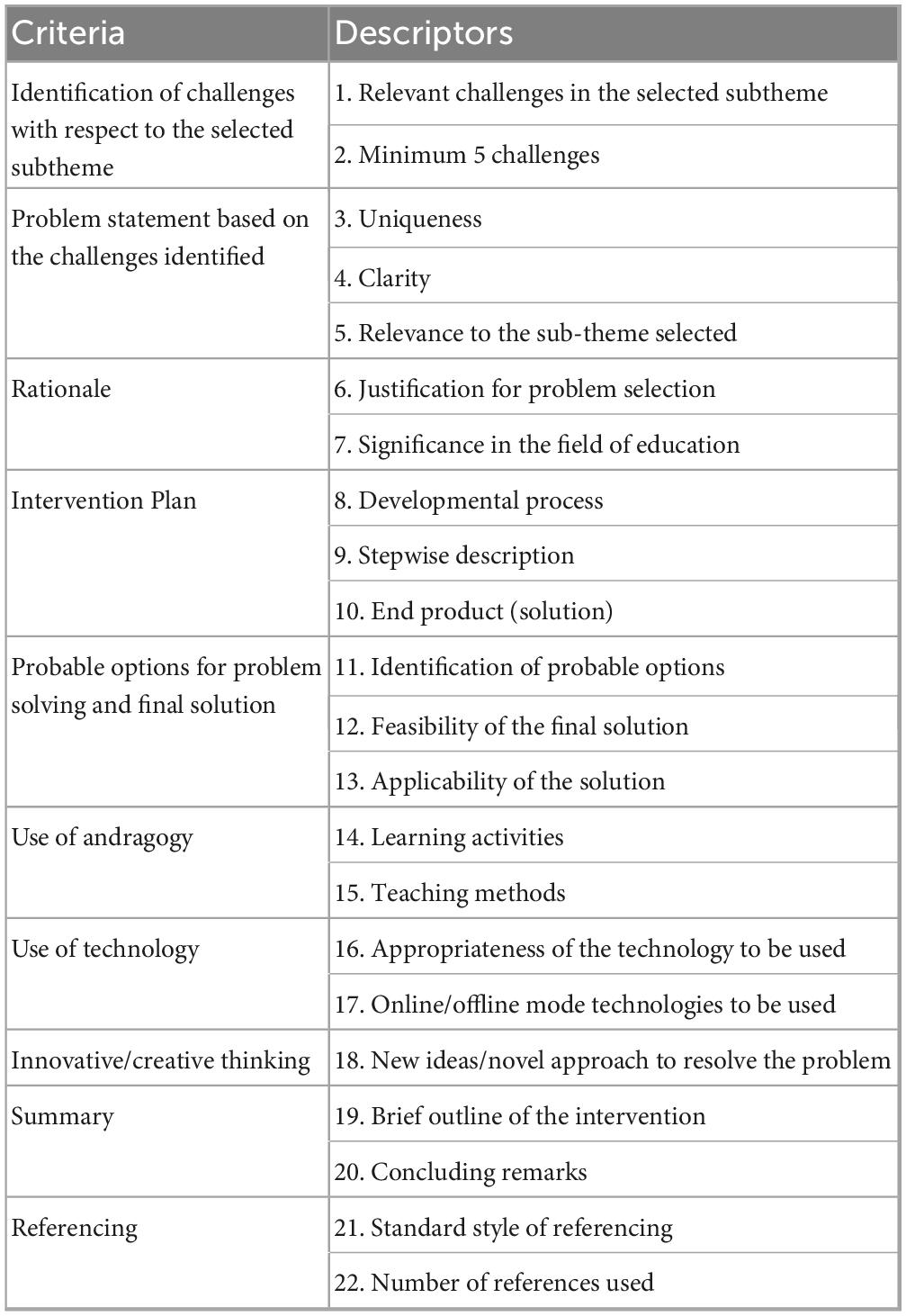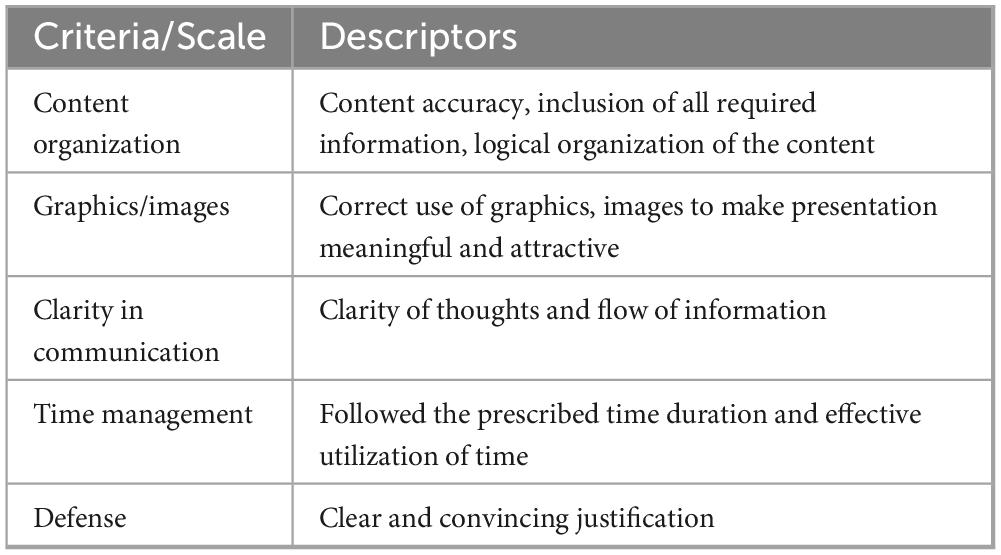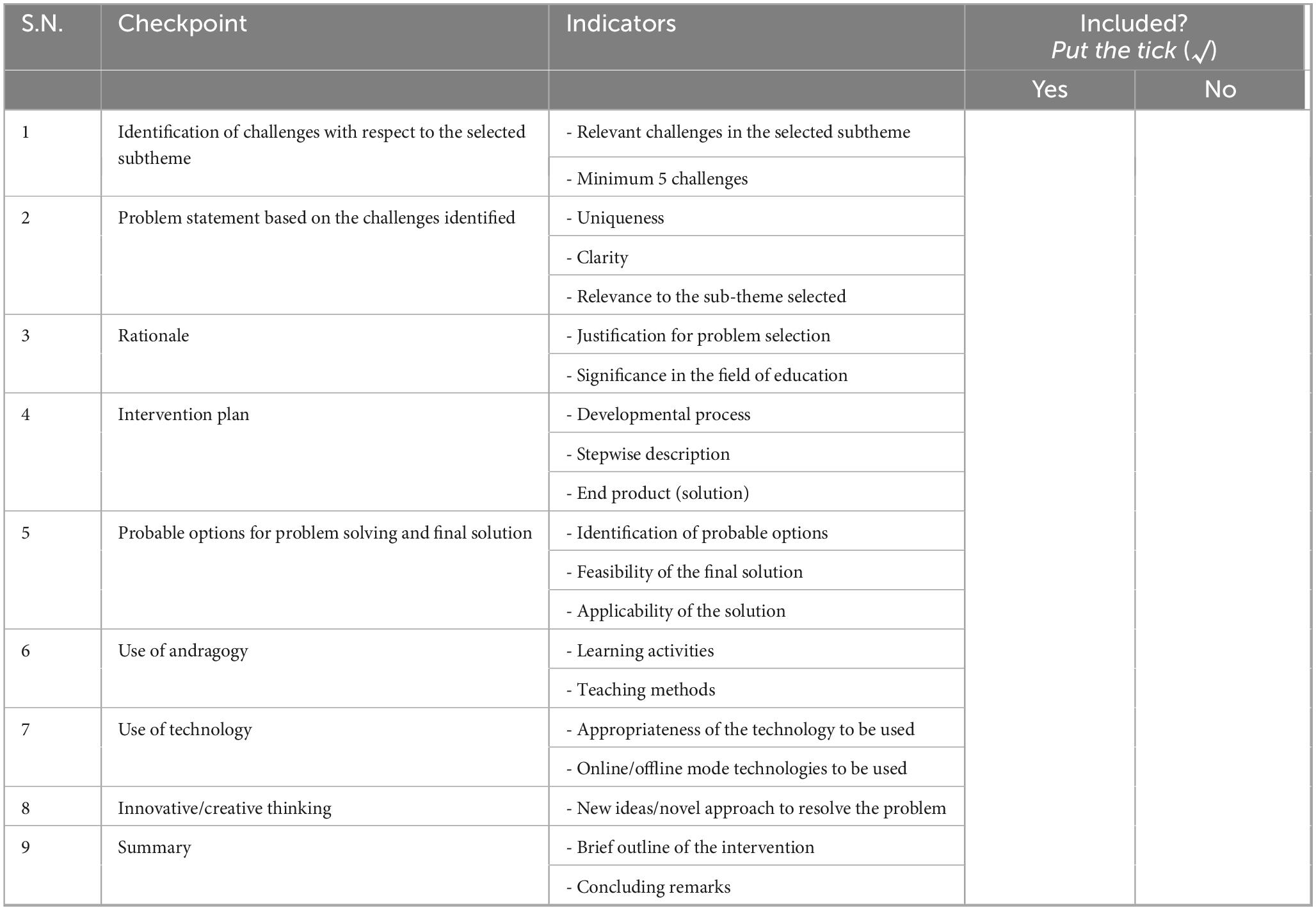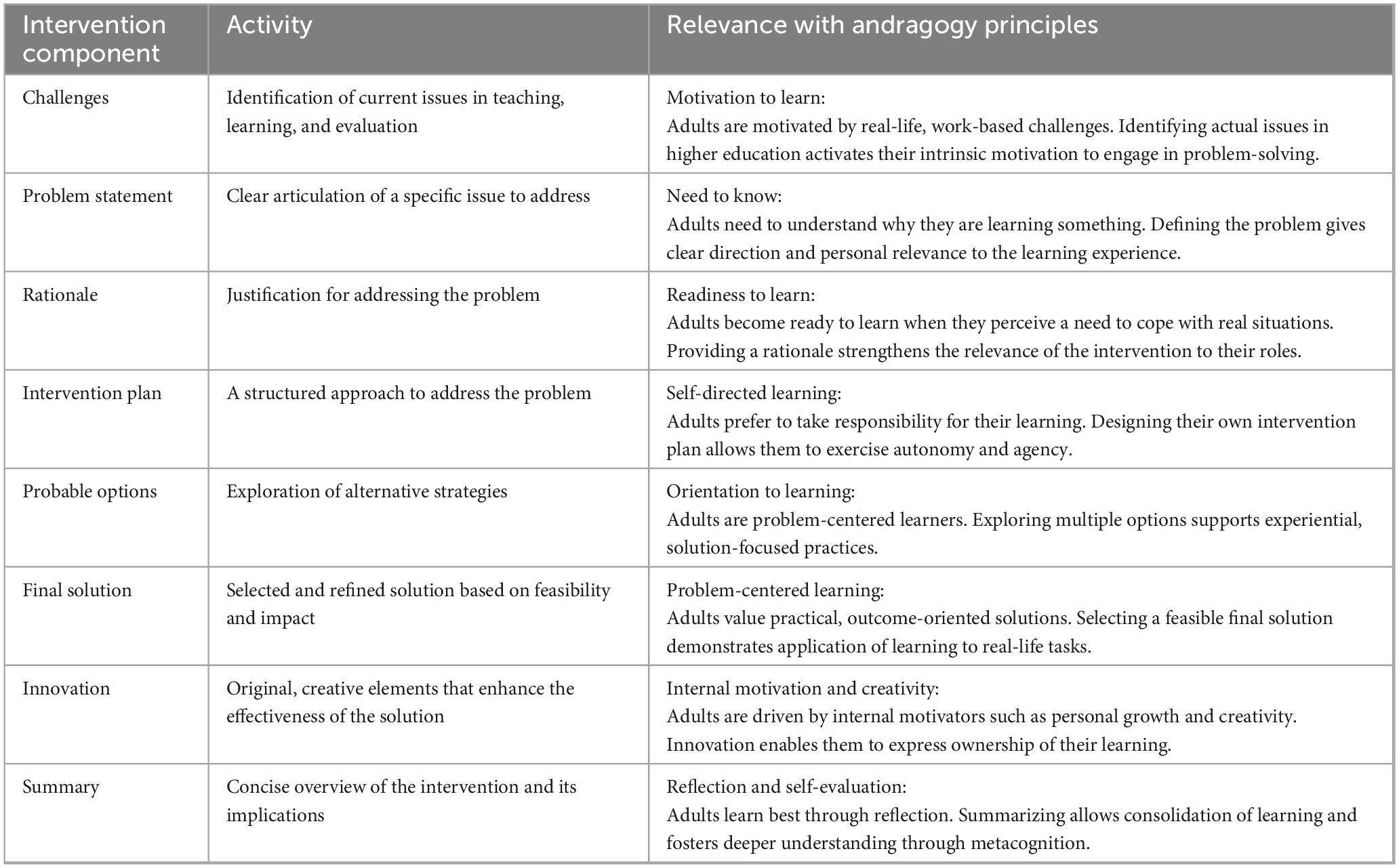- 1Symbiosis Teaching Learning Resource Centre (STLRC), Symbiosis International (Deemed University), Pune, India
- 2Department of Computer Science, Center for Applied Mathematics and Bioinformatics (CAMB), College of Arts & Sciences, Gulf University for Science and Technology, Kuwait City, Kuwait
This paper explores how a hackathon-based approach can enhance the application of andragogical principles and how higher education institutions can implement a teacher-focused initiative, the Teaching-Learning-Evaluation (T-L-E) Hackathon, to promote problem-solving, collaboration, and the design of innovative interventions in teaching, learning, and evaluation. Unlike traditional hackathons centered on software development, the T-L-E Hackathon engages educators in collaboratively addressing real-world educational challenges and developing practical instructional solutions. This case study presents the roadmap for planning and executing the hackathon, highlighting its structured process and evaluation criteria. A total of 53 teams comprising 185 faculty members from 10 cities in Maharashtra and 8 other Indian states participated. The T-L-E Hackathon emerged as a systemic tool for educational transformation, integrating teachers’ voices into the broader discourse of educational reform and fostering innovation directly linked to classroom practice.
1 Introduction: context and background
The concept of a hackathon originated in the field of Computer Science, where it refers to collaborative events in which programmers and others in software development come together to build innovative solutions under time constraints. In recent years, hackathons have gained popularity across disciplines- including healthcare, biosciences, and business- for their ability to stimulate fast-paced collaboration and innovation. However, their application in education, especially in the context of teacher development, remains unexplored.
Academicians and educators in the higher education ecosystem have continuously expressed the need for creativity and innovation in the process of teaching, learning and evaluation. Among the various initiatives taken by educational institutions globally, one widely adopted approach for fostering creativity, problem-solving, innovation and teamwork is the hackathon.
Hackathons are collaborative multi-day events that bring participants together to work on specific challenges (Braune et al., 2021) and are increasingly used to identify urgent needs and create new systems, services, and tools (Silver et al., 2016). While most documented hackathons are found fields such as computer science, medicine, healthcare, and biosciences, their potential in education is gaining attention. In educational contexts, hackathons facilitate collaborative learning, innovative thinking (Olson et al., 2017) and peer-driven learning (Nandi and Mandernach, 2016), and offer a novel structure to tackle complex instructional problems (Brown et al., 2018). Virtual hackathons, in particular, have demonstrated effectiveness in addressing unmet needs (Bolton et al. 2020). This team-based format also enhances applied learning, as evidenced by its integration in classroom experiences like the “Markathon” (Calco and Veeck, 2015) and course-embedded hackathon models (Gama et al., 2018). Hackathons were even adopted for emergency remote learning during the COVID-19 pandemic (Gama et al., 2021), and in healthcare education they contributed to increased levels of active learning (Monsef et al., 2021). Unlike traditional coding hackathons, the T-L-E Hackathon shifts focus toward collaborative problem-solving in education, which is discussed in detail in later sections.
A bibliometric analysis conducted by Garcia (2023) covering 249 publications from 2014 to 2022, explored the adoption of hackathons beyond the technology sector. The study showed that hackathons are most prevalent in the fields of science, social sciences, engineering, management, and business, while their application in healthcare remains emerging. Reflecting this trend, the T-L-E Hackathon attracted multidisciplinary participation, with educators from pharmaceutical sciences, engineering, management, technology, education, humanities, architecture and design, health sciences, commerce, pure sciences, and forensic sciences. This wide participation highlights the need for educational hackathons like the T-L-E Hackathon as a valuable platform for holistic problem-solving, where educators from diverse knowledge domains can collaboratively address common educational challenges faced by the teaching community.
Several previous studies have explored the use of hackathons as pedagogical tools across various contexts. Kienzler and Fontanesi (2017) conducted a Global Health Hackathon as an inquiry-based learning strategy for undergraduate students. Similarly, Steglich et al. (2020) introduced hackathons as a complementary pedagogical tool for teaching software engineering, although their focus was not specifically on addressing teaching-learning challenges. Duhring (2014) considered hackathons within the framework of educational technology, discussing their structural dynamics and suggesting their potential academic relevance.
Hackathons have also been employed as a methodology for challenge-based learning (Vilariño and Serra-Ruiz, 2021), while Lyons et al. (2021) highlighted their potential for promoting knowledge development and transversal skill acquisition as pedagogical innovations. Further, Avila-Merino (2019) demonstrated the significant role of hackathons in developing entrepreneurship skills, and Gama et al. (2021) emphasized their effectiveness in promoting group work and collaboration.
Hackathons provided an innovative approach for problem solving. An innovative open science hackathon integrated within a Sensitize-Train-Hack-Collaborate model, was conducted aimed at building capacity and raising awareness of open science practices in Kenya, focusing on leveraging bioinformatics expertise to collaboratively explore the state of open science and generate practical, open-access publishing solutions (Mwangi et al., 2021).
While traditional hackathons in computer science emphasize rapid software development, coding competitions, and product-based outcomes, the T-L-E Hackathon departs significantly from this model. It is not focused on technical tools or prototypes but rather on educational challenges, where the primary outcomes are pedagogical solutions, reflective practices, and collaborative innovations. A teaching-learning-evaluation (T-L-E) hackathon is designed to address challenges and promote creativity in the educational sector through technology integration and collaborative engagement. The experiences gained by faculty through such hackathons can be replicated in their classrooms, using the hackathon as a teaching–learning strategy to enhance student engagement, foster problem-solving, and encourage instructional innovation. The major objectives of T-L-E hackathons are to cultivate a culture of ongoing innovation and excellence in teaching practices and learning outcomes. These goals align closely with the broader mandate of continuous improvement in higher education. This case describes our experiences of conducting an innovative faculty-centered hackathon- the T-L-E Hackathon-, a nationwide contest designed for the higher education teachers to collaborate, brainstorm, interact, and develop solutions to shared challenges in teaching, learning, and evaluation. Unlike student-centered hackathons that test programing skills, the T-L-E Hackathon fosters faculty engagement, encourages professional dialogue, and promotes the co-creation of instructional strategies aligned with andragogical principles.
Although the T-L-E Hackathon allowed participants to choose from a wide range of open-ended challenges, this flexibility was intentional. It reflected the adult learning principle of learner autonomy, giving educators the opportunity to solve problems that are directly relevant to their teaching context. A common structure, guided by the problem-solution format and standardized evaluation criteria, ensured coherence and comparability across projects despite the thematic diversity.
The T-L-E Hackathon intentionally brought together a diverse group of educators from various disciplines, institutions, and levels of teaching experience. Although this inclusive approach encouraged rich collaboration and broad applicability, it also introduced complexity in evaluating the intervention’s impact on any single educator profile. We recognize this as a limitation and recommend that future iterations consider focusing on a more specific participant group to facilitate deeper assessment of learning outcomes.
Despite the growing body of work, our review confirms that educational hackathons targeting the three core dimensions of education- teaching, learning, and evaluation- are still rare. Most of the existing research focuses on student-led hackathons, particularly within computer science and STEM education, where hackathons serve as tools for demonstrating technical learning outcomes. While a few studies have explored hackathons designed for faculty, including those focused on instructional redesign, assessment practices, or blended learning approaches, these efforts often lack the structured, scalable blueprint and the alignment with adult learning theories that characterize the T-L-E Hackathon. Compared to these initiatives, the T-L-E Hackathon introduces a more holistic, pedagogically grounded, and replicable model for collaborative problem-solving in higher education.
There is a noticeable lack of recent literature on the design and impact of hackathons for faculty in higher education settings. This gap motivates the present study, which explores a structured approach to faculty-centered educational hackathons as a strategy for professional development, instructional innovation, and collaborative problem-solving in teaching, learning, and evaluation. The study adopts a case study methodology, detailing the design, implementation, and evaluation of the T-L-E Hackathon as an intervention for faculty development.
2 Methods and procedure: the teaching-learning-evaluation hackathon—a case study
The term “Teaching-Learning-Evaluation Hackathon” (T-L-E Hackathon) is not yet a widely recognized concept. This article presents a detailed case study of the “T-L-E Hackathon,” a nationwide initiative conducted for university educators, aimed at promoting creative thinking and collaborative problem-solving to plan innovative interventions in the teaching-learning-evaluation process. A blueprint for institutional implementation is presented, organized into three distinct phases: Planning, Execution and Evaluation. The planning phase involved identifying key focus areas, designing the hackathon roadmap, and outlining specific planning components. The execution phase includes Pre-Hackathon activities, In-Hackathon activities, and Post-Hackathon activities. The evaluation phase comprised a multi-layered assessment process, including progressive evaluation stages and a four-level scrutiny. This case study explores a groundbreaking structured approach to educational hackathons, emphasizing the integration of technology to foster creativity and empower educators to adapt different methods of teaching, learning and evaluation. It helps discover how these educational hackathons can drive innovation and collaboration in higher education with its andragogical alignment. While this study focuses on faculty, future adaptations of teaching-learning-evaluation hackathons for students may enhance learner engagement through hand-on learning, and also encourage the innovation and experimentation for collaborative problem solving.
The researchers ideated the T-L-E Hackathon based on the effectiveness of hackathons in today’s technology embedded education system. The innovative component of this competition lies in its application in the field of education, unlike other hackathons which are specific to coding tasks. This hackathon aimed at providing a collaborative platform to the teachers in higher education space to identify, discuss and find feasible solutions to the problem related to teaching, learning and/or evaluation they were facing. The case study addresses two central research questions:
1. How does using a hackathon-based approach support the application of andragogy principles in adult learning?
2. How can higher education institutions plan and implement educational contest – T-L-E Hackathons to promote problem solving, collaboration and planning “Innovative Interventions” in the teaching-learning-evaluation process?
To investigate these questions, we adopted a case study approach to develop a multi-faceted, in-depth understanding of a complex process of planning, executing and evaluating teacher-created innovative interventions to resolve current educational issues, showcased through a contest called the T-L-E Hackathon. The case was studied using 3 aspects – Planning, Execution and Evaluation.
2.1 Planning
The aim of this nationwide educational contest, the T-L-E Hackathon, was to promote creativity in thinking and planning for “innovative interventions” in the teaching-learning-evaluation process, resulting in a better learning experience for all. Thus, faculty members, and researchers were invited to work together to solve various challenges faced by universities, especially during the pandemic, which changed the way of life for the entire world.
The hackathon was designed based on Knowles’ four principles of andragogy (Yopp et al., 2013):
1. Involved adult learners: This principle states that adult learners should be involved in the planning and evaluation of their learning. The T-L-E Hackathon was planned in such a way that participants were free to plan their group work, assign tasks, decide individual roles, select their problem, find solutions, and present their work.
2. Adult learners’ experience: As stated by Knowles (1984), experience provides the basis for learning. In the hackathon, participants were practicing teachers with extensive experience in their respective fields. The challenging tasks were designed to encourage them to share their views and experiences for identifying and solving problems.
3. Relevance and impact on life: Immediate relevance creates impact for adult learners. The hackathon was planned to provide collaborative learning and problem-solving opportunities, enabling participants to find effective solutions that could be applied directly to their instructional and evaluation practices, thereby impacting student learning.
4. Problem-centered approach: As suggested by Knowles, the adult learning should be problem-centered rather than content-oriented. The hackathon was fully focused on problem-solving, aiming to yield practical solutions that could be applied immediately to improve instruction and assessment for better learning outcomes.
While the broad theme for this Hackathon was “Innovations in Teaching-Learning-Evaluation,” five sub-themes were announced on the day of the event:
(1) Active learning experience
(2) Differentiated instruction
(3) Differentiated evaluation
(4) Assessing outcome based global collaborations
(5) Using games for teaching-learning-evaluation
The T-L-E Hackathon was open to all faculty of the University and Higher Education Institutions across India, providing an opportunity to showcase their creativity by offering innovative solutions to overcome challenges in higher education. The distinctive features of the T-L-E Hackathon included:
- Tagline: Identify-Ideate-Solve-Evolve
- 24 h event
- Teamwork (2–5 members)
- Interdisciplinary collaborations encouraged
- Online Zoom platform for collaboration, discussion, and problem-solving
- Multiple rounds
- Evaluation of each round by the Jury
- Special rewards presented to the winning team
The planning phase consisted of five major areas of concern identified to support effective decision-making, along with their relevant specific aspects, as presented in Figure 1. These areas included: the nature of the event, the selection of themes and sub-themes, setup for hosting the event online, the marketing strategy, and budgeting.
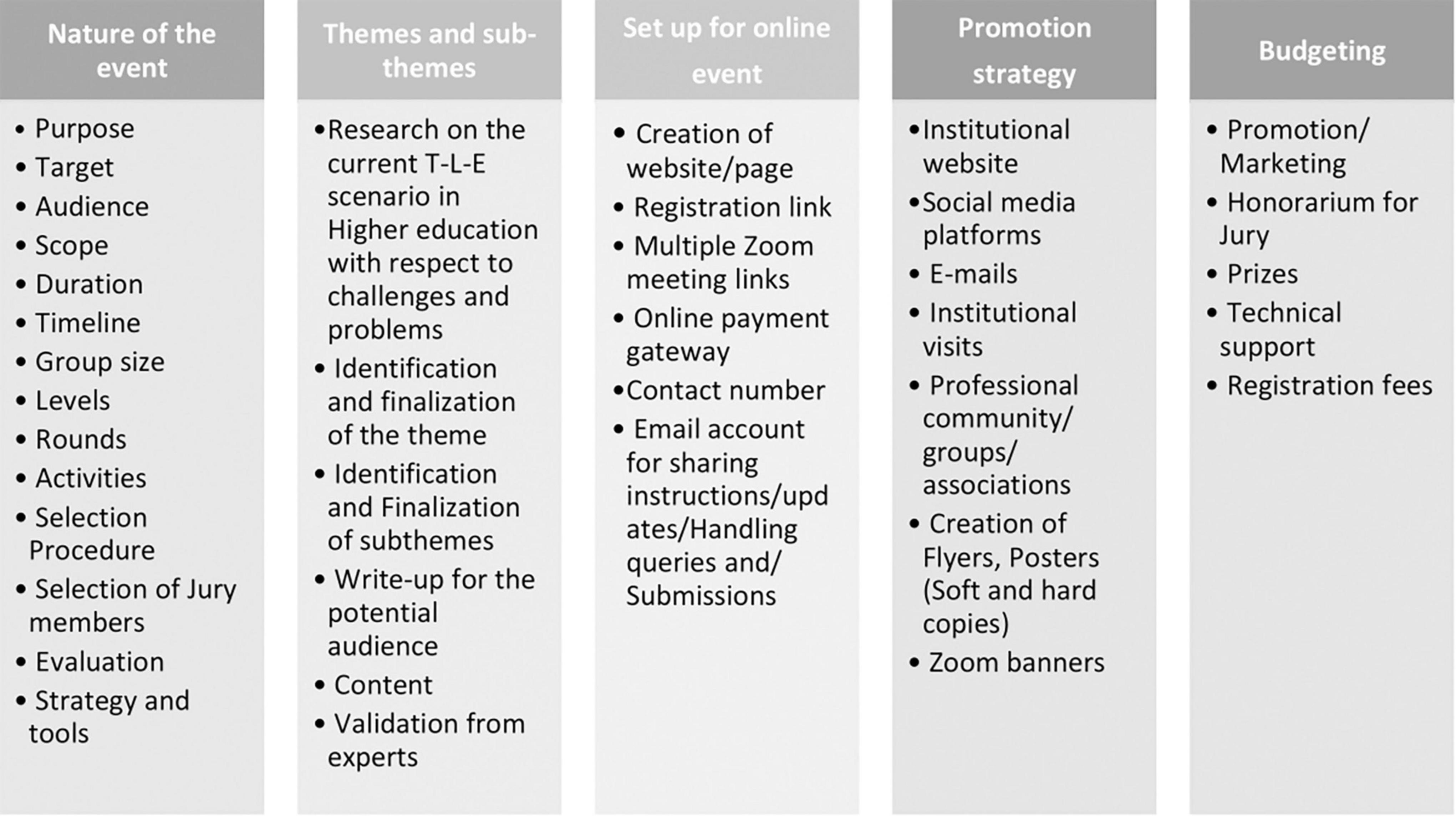
Figure 1. Major areas for planning the T-L-E hackathon. This figure presents the five key areas considered during the planning phase of the T-L-E Hackathon: event structure, thematic framework, virtual platform setup, promotional strategy, and budgeting. These domains provided a strategic foundation for the design and organization of the event and ensured alignment with the institutional mission and the andragogical needs of faculty participants.
For evaluation the organizers should also consider—Creation of appropriate (a) Evaluation rubrics (b) Evaluation sheets with evaluation guidelines for jury members and (c) Feedback forms.
Based on the planning inputs and data generated for each key aspect, a comprehensive roadmap was developed, as demonstrated in Figure 2, to ensure a smooth and barrier-free execution of the T-L-E Hackathon.
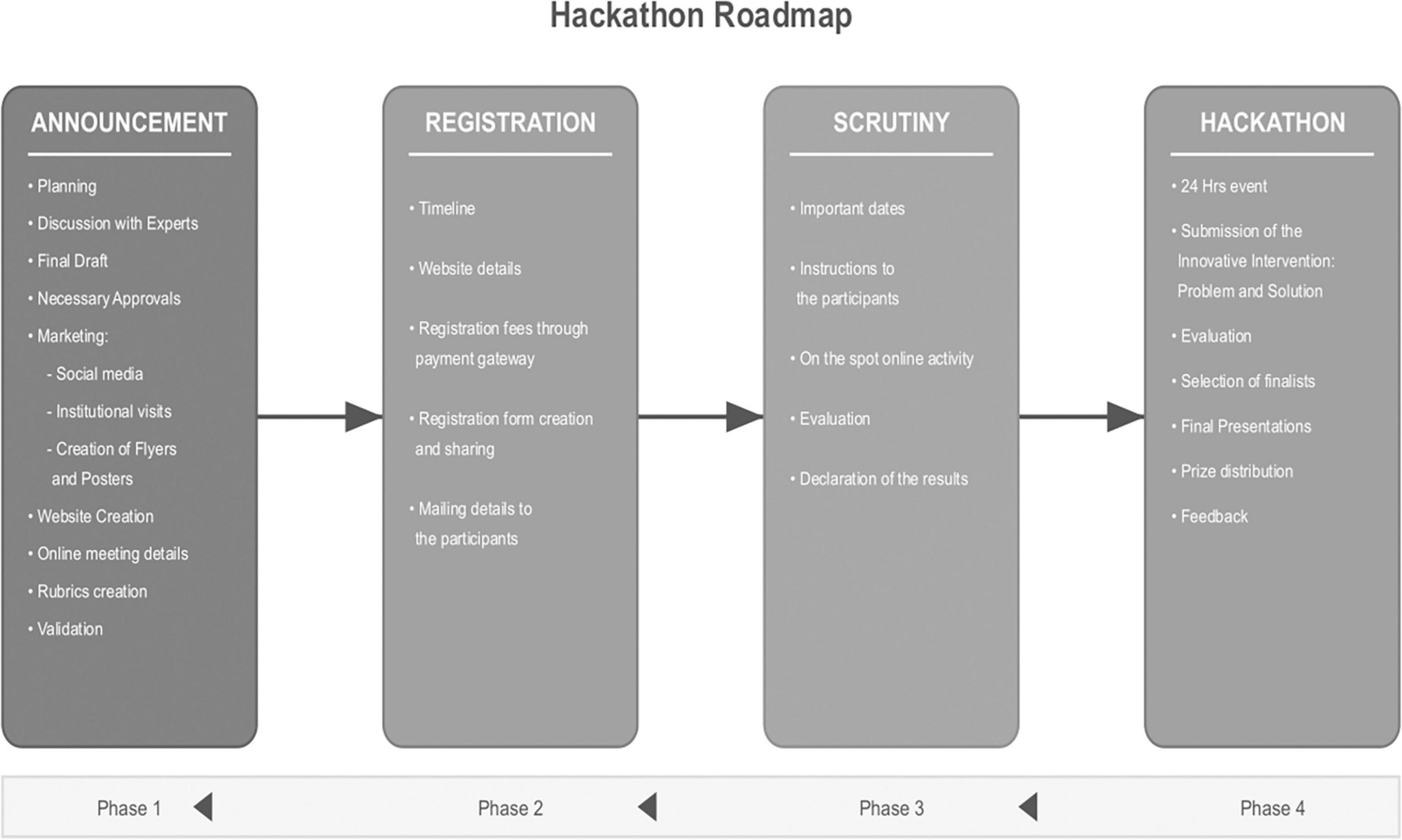
Figure 2. The T-L-E hackathon roadmap. Created by authors with AI assistance; CC-BY 4.0 License. The roadmap illustrates the complete planning and implementation cycle of the T-L-E Hackathon, divided into three main phases: Planning, Execution, and Evaluation. Each phase is composed of specific activities and checkpoints that guided the process from initial concept to final assessment, offering a replicable model for institutions interested in faculty-centered innovation events.
2.2 Execution
This interdisciplinary team-based competition spanned 4 days and was the first of its kind in the field of education to focus specifically on identifying challenges in teaching, learning and evaluation, and proposing viable, innovative solutions. The T-L-E Hackathon execution process consisted of 3 phases: Pre-Hackathon activities, In-Hackathon activities, and Post-Hackathon activities.
2.2.1 Pre-hackathon activities
The process began with the official announcement of the T-L-E Hackathon. Creatives in the form of flyers and posters were circulated to stakeholders in higher education through institutional websites, social media platforms, and in-person visits to higher education institutions. Emails were sent to university authorities and educational groups. Follow-ups and reminders were shared periodically, along with registration guidelines. Upon confirmation, registered participants were provided with detailed instructions regarding the hackathon process.
2.2.2 In-hackathon activities
2.2.2.1 Participants
Fifty-four teams comprising 197 faculty members registered from 10 cities in Maharashtra and 8 other Indian states. Participants came from a wide range of disciplines, including Pharmacy, Science & Technology, Architecture & Design, Information Technology, Engineering, Health Sciences, Management, Arts & Commerce, Forensic Sciences, Education, Law, and more. Of these, 53 teams actively participated in the event.
2.2.2.2 Day 1—round 1: creation of MCQs
Teams joined an online session 1 week prior to the Hackathon to complete Round 1. Participants were tasked with creating at least 10 multiple-choice questions related to the announced themes. A submission template, performance expectations, and evaluation criteria were shared in advance. The allocated time was 30min. Submission were evaluated using a rubric, although no teams were eliminated, this round served to encourage collaboration and build readiness for the main hackathon.
2.2.2.3 Day 2 and 3—round 2: developing sustainable interventions
Over a 24 hours period, teams worked on developing an innovative intervention using a problem-solving approach. The task brief, evaluation rubric, and template were shared, after which five sub-themes were disclosed. Each team selected one sub-theme and followed the below structure:
- Problem Statement: Teams identified a significant challenge within the chosen sub-theme, define the target group, and explained the rationale.
- Solution: Teams proposed an innovative, viable solution; outlined a plan of action; and explained how the approach integrated andragogy principles and technology tools.
Teams submitted their interventions and a self-assessment checklist by email. The jury evaluated each submission using a rubric, and the top 18 teams were selected for the final round based on their combined scores from Rounds 1 and 2.
2.2.2.4 Day 4—round 3: the finale
The top 18 teams presented their work in live sessions before a final jury panel. Each team was given 8 min to present, followed by a short Q&A. Presentations were evaluated based on content and delivery using a structured rubric. The winners were announced during the closing prize distribution ceremony, and three top teams were recognized.
2.2.3 Post-hackathon activities
Feedback was collected from both participants and jury members to assess the effectiveness of the event and gather insights for improvement. The overall T-L-E Hackathon process is presented in Figure 3. This structured execution process ensured active engagement, real-time collaboration, and solution-oriented thinking aligned with andragogical practices.
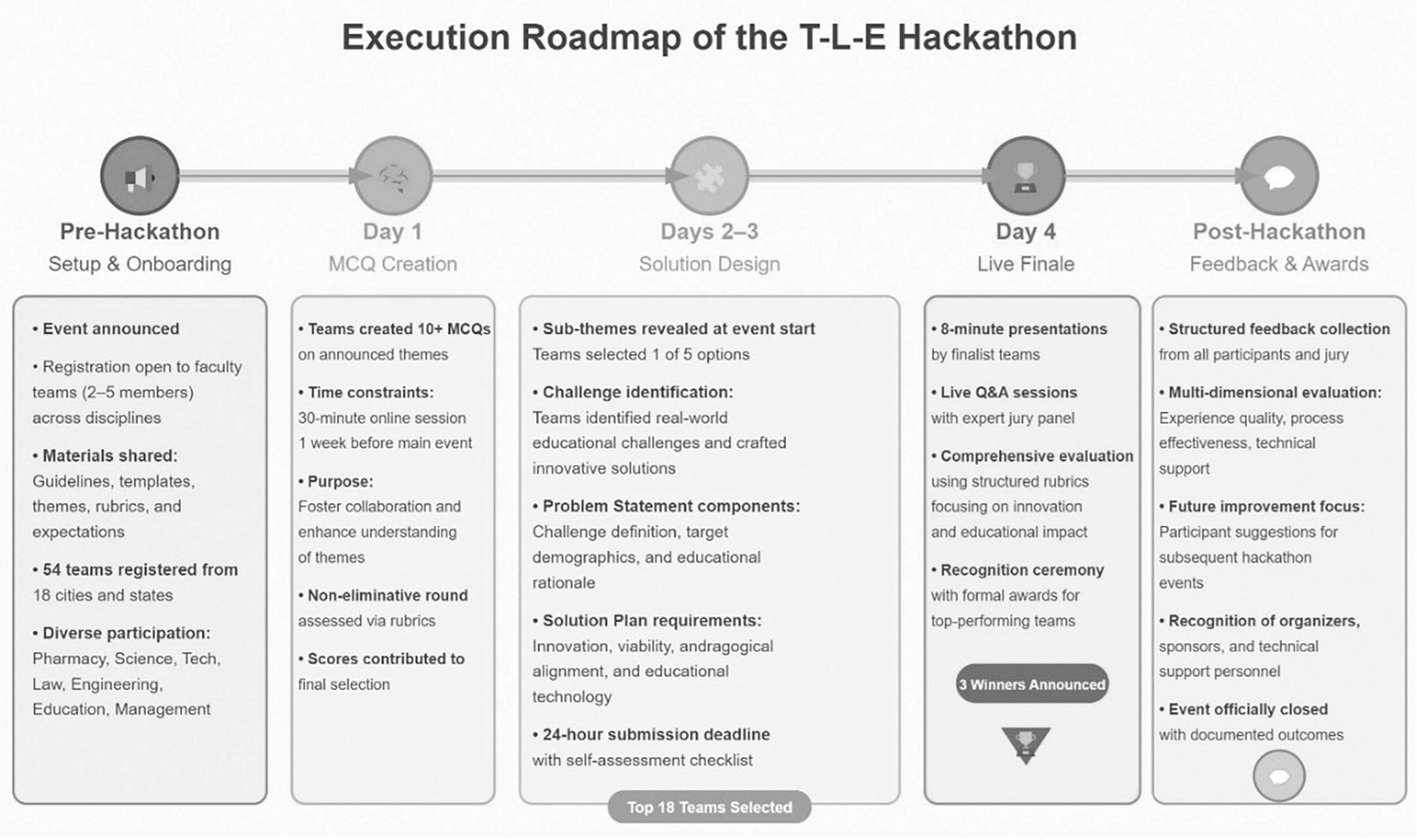
Figure 3. Execution process of the T-L-E hackathon. Created by authors with AI assistance; CC-BY 4.0 License. This figure maps the 4-day execution process of the hackathon, detailing activities across three rounds: MCQ creation, problem-solution intervention design, and live team presentations. The timeline showcases how teams were progressively challenged to ideate and present educational innovations within a structured virtual environment.
2.3 Evaluation
All the submissions were very creative and noteworthy. A panel of 18 jury members were involved in evaluating the submissions from participating teams at various stages of the T-L-E Hackathon. Based on this evaluation, 18 finalist teams were selected to present their interventions before a top-tier jury composed of eminent educationists. Participants’ performance across the various rounds was assessed using multiple structured assessment tools, guided by clearly defined criteria. The evaluation process, as illustrated in Figure 4, progressed through four levels of scrutiny:
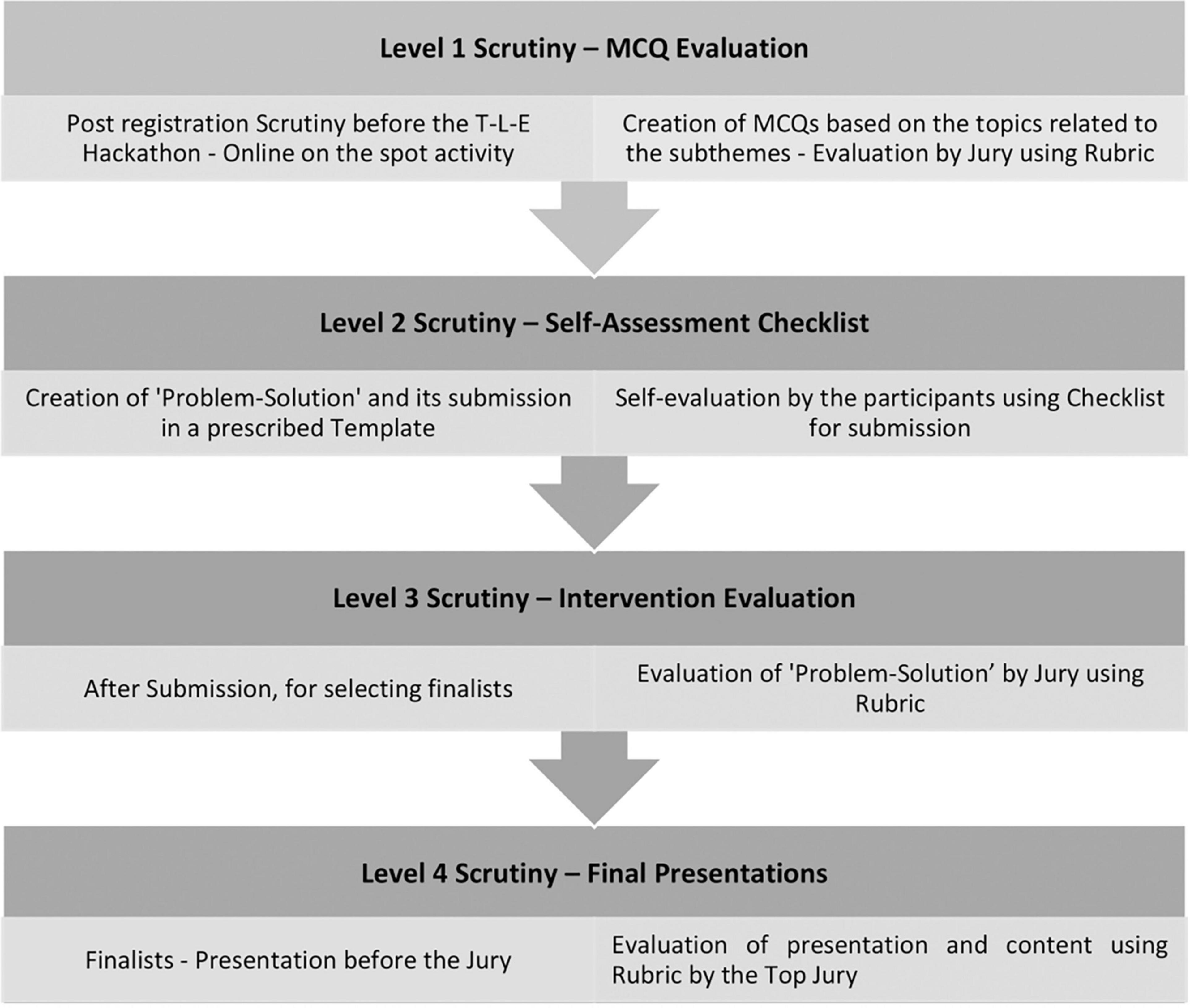
Figure 4. The T-L-E hackathon evaluation progression. This diagram outlines the four-tier evaluation process applied during the hackathon: (1) MCQ evaluation using an analytical rubric, (2) submission of a self-assessment checklist, (3) review of problem-solution intervention plans, and (4) live presentation evaluation by an expert jury. Each level involved distinct criteria to ensure comprehensive, fair, and multidimensional assessment of team performance.
2.3.1 Level 1 scrutiny—MCQ evaluation
As described earlier, teams participated in an initial round focused on the creation of multiple-choice questions (MCQs) based on their chosen topics. An analytical rubric with predetermined criteria was used to assess the quality of the MCQs. The criteria included:
(a) Correctness in construction
(b) Relevance to the theme
(c) Cognitive level of questions
(d) Versatility in question types
(e) Clarity and grammatical accuracy
2.3.2 Level 2 scrutiny—self-assessment checklist
A self-assessment checklist was provided to participants alongside the intervention submission template. The checklist consisted of Yes/No criteria designed to ensure the correctness and completeness of the “Problem-solution” intervention plan. Participants were required to submit this checklist along with the submission template. The checklist components included:
(a) Challenges
(b) Problem statement
(c) Rationale
(d) Intervention plan
(e) Probable options
(f) Final solution
(g) Andragogy tools used
(h) Technology tools
(i) Innovation
(j) Summary
(k) References
2.3.3 Level 3 scrutiny—intervention evaluation
Participants submitted a detailed Problem-Solution intervention plan using a standardized template. Each team was expected to develop an innovative solution addressing a challenge within their selected sub-theme. Jury members used an analytical rubric to assess each submission based on the following criteria:
(a) Alignment of identified challenge with sub-theme
(b) Clarity of the problem statement
(c) Rationale of the problem
(d) Structure and feasibility of the intervention plan
(e) Variety of solution options and final recommendation
(f) Integration of andragogical principles
(g) Use of technology
(h) Creativity and innovation
(i) Summary
(j) Referencing
2.3.4 Level 4 scrutiny—final presentations
The 18 finalist teams were evaluated during live presentations by a top-tier jury using a separate rubric focused on Presentation and Content. The evaluation criteria for the presentations included:
(a) Relevance of the intervention
(b) Scalability of the solution
(c) Clarity and coherence (Lucidity)
(d) Deployability
(e) Innovation
2.4 Impact
The hackathon roadmap, as outlined and implemented from start to finish, ensured a structured and systematic process. The distribution of the theme-wise interventions developed collaboratively by participants is shown in Figure 5.
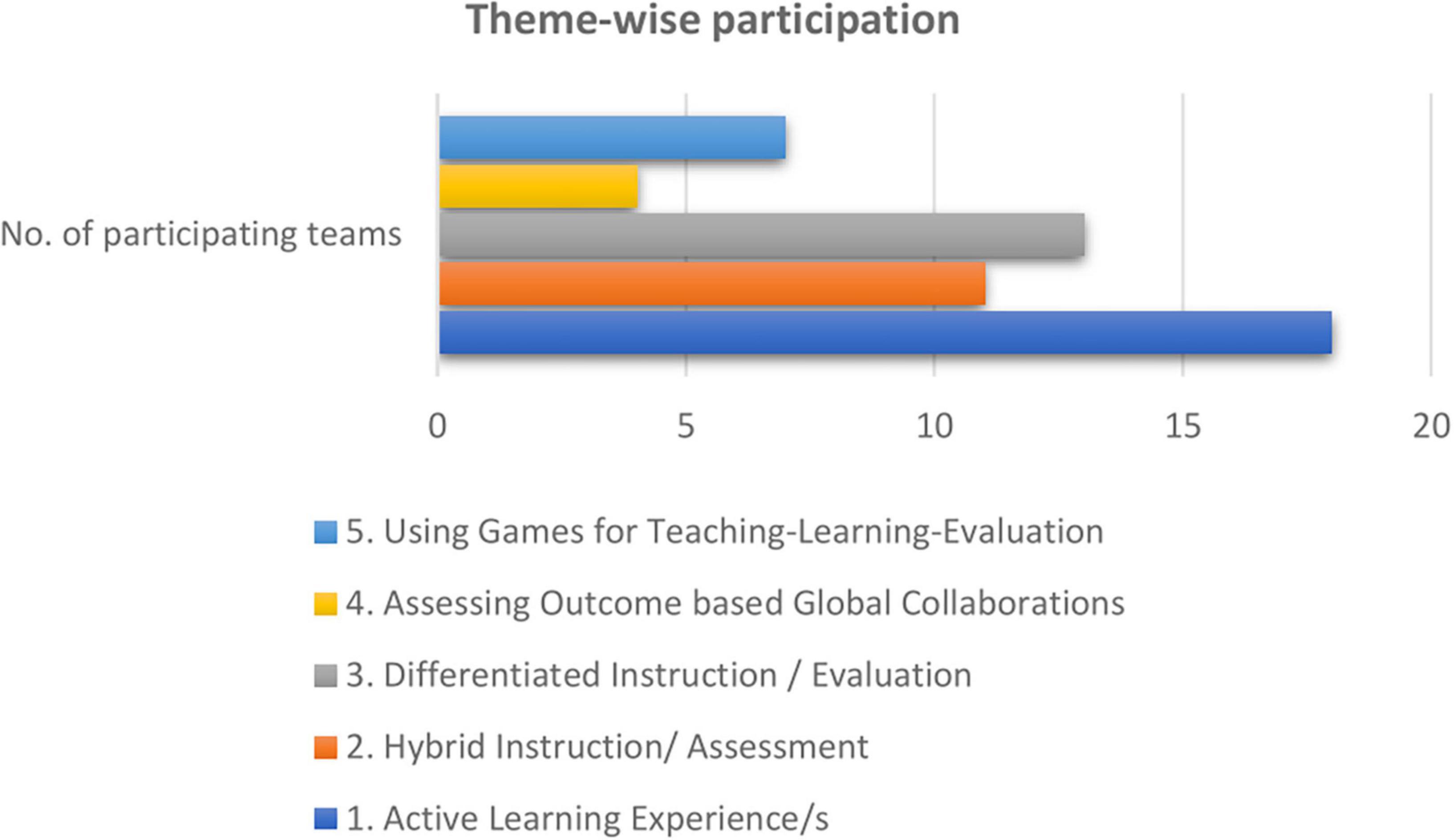
Figure 5. Distribution of theme-wise interventions in the T-L-E hackathon. This figure summarizes the distribution of educational interventions across the five sub-themes offered during the hackathon. It demonstrates the thematic preferences of the 53 participating teams and provides insight into the areas educators most frequently identified as requiring innovation in teaching, learning, and evaluation.
Participants feedback highlighted the positive learning experience gained through the event. To assess impact, a feedback survey using a rating scale was conducted, and 115 participants voluntarily responded. All responses were collected with informed written consent. The analysis of these responses presents an overview of the participant’s experience, summarized in Figure 6, which reflects the overall perceived success and satisfaction with the hackathon.
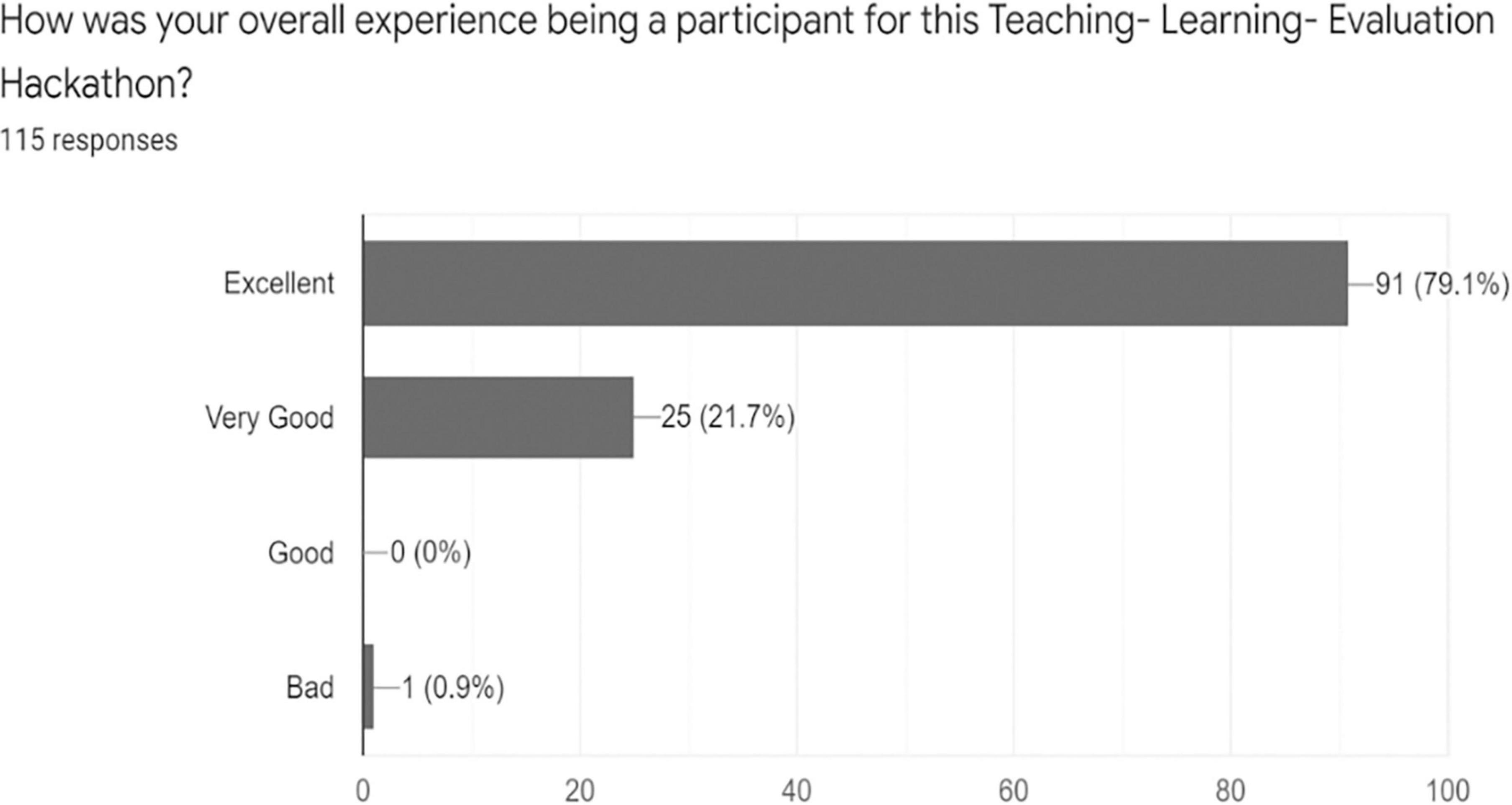
Figure 6. Participants’ experience and impact assessment of the TLE hackathon. This chart presents participant feedback collected from 115 respondents through a structured post-event survey. The responses reflect satisfaction with the hackathon experience, perceived learning outcomes, and readiness to implement solutions. The figure supports claims regarding the event’s educational impact, engagement value, and scalability.
The T-L-E Hackathon resulted in the development of numerous creative, innovative, and practical solutions aimed at addressing contemporary challenges in the educational landscape. In addition, the hackathon encouraged collaboration, cross-disciplinary dialogue, and idea-sharing among educators. The event also gave faculty members a fresh lease on life, motivating them to explore cutting-edge strategies in teaching, learning, and evaluation, and to engage with the educational possibilities offered by technology.
2.5 Alignment with the andragogy principles
The T-L-E Hackathon was conceptualized and implemented based on the principles of andragogy, which were integrated in the structure, process, and intended outcomes of the event. The application of andragogy ensured that the T-L-E hackathon aligned with the core characteristics of adult learning, fostering autonomy, relevance, collaboration, and the effective use of participants’ prior experiences. The alignment of andragogy with the design and execution of the T-L-E hackathon is summarized in Table 1.
2.6 Challenges
Due to the limited availability of reference models for conducting hackathons specifically in the context of teaching, learning, and evaluation, particularly for a multidisciplinary teaching community, the organizers encountered several challenges, including:
• Managing time effectively within the specified schedule for large groups
• Identifying suitable experts for participation and evaluation
• Providing continuous support throughout the event
• Ensuring timely evaluation and announcement of results
• Operating with limited manpower
These challenges can be addressed through effective resource management, collaborative organization, and the involvement of a larger pool of experts in the evaluation process. Additionally, assigning clear responsibilities among organizers and securing adequate funding for a robust and efficient technological setup are crucial for the successful execution of such events. Addressing these challenges not only ensures smoother execution but also enhances the potential scalability and replicability of such hackathon models in higher education contexts.
2.7 Research design and data analysis
This case study employed a mixed-methods approach focused on evaluating faculty-developed interventions during the T-L-E Hackathon through structured rubrics, self-assessment checklists, and participant feedback. Following section presents the details of the tools and analyses.
2.7.1 Data sources
• Rubric-based evaluations of team submissions at different rounds (detailed in tables).
• Self-assessment checklists submitted by teams.
• Post-event feedback survey completed by 115 out of 185 participants.
2.7.2 Instruments used
Following instruments were used during the hackathon for evaluating the submissions/performance of participants during the multiple rounds of the contest. The details are as follows:
2.7.2.1 Evaluation for round 1: creation of MCQs
As discussed in the hackathon execution process, participants were asked to create and submit MCQs for Level–1 of the T-L-E Hackathon. The evaluation criteria used for assessing the quality of submission are given in Table 2.
The 4- point scale was used for this analytical rubric, and for each participant individual scores were obtained (Maximum score–20). These scores were combined with the Level-2 scrutiny scores to select teams for the next round.
2.7.2.2 Evaluation for round 2: developing sustainable interventions
Participants submitted their intervention plans created during 24-h of the hackathon and submitted in the given template. Evaluators used the rubric having 10 criteria and scores were given. The criteria and respective descriptors used in the rubric are presented in Table 3.
The 4- point scale was used for this analytical rubric, and scores were obtained (Maximum score—40) per team. These scores were combined with the Level-1 scores (MCQs creation) to select teams for the next round (Maximum score—60). Finally, 18 top scoring teams were shortlisted for the next round, that achieved a score exceeding 70% to ensure a baseline level of quality.
2.7.2.3 Evaluation for round 3: the finale
The selected teams for the finale presented their work before the jury, and were evaluated using two separate rubrics—one for content and other for the delivery/presentation of the intervention. The criteria for rubric assessing content of the intervention submitted and presented by the teams are as follows (Table 4).
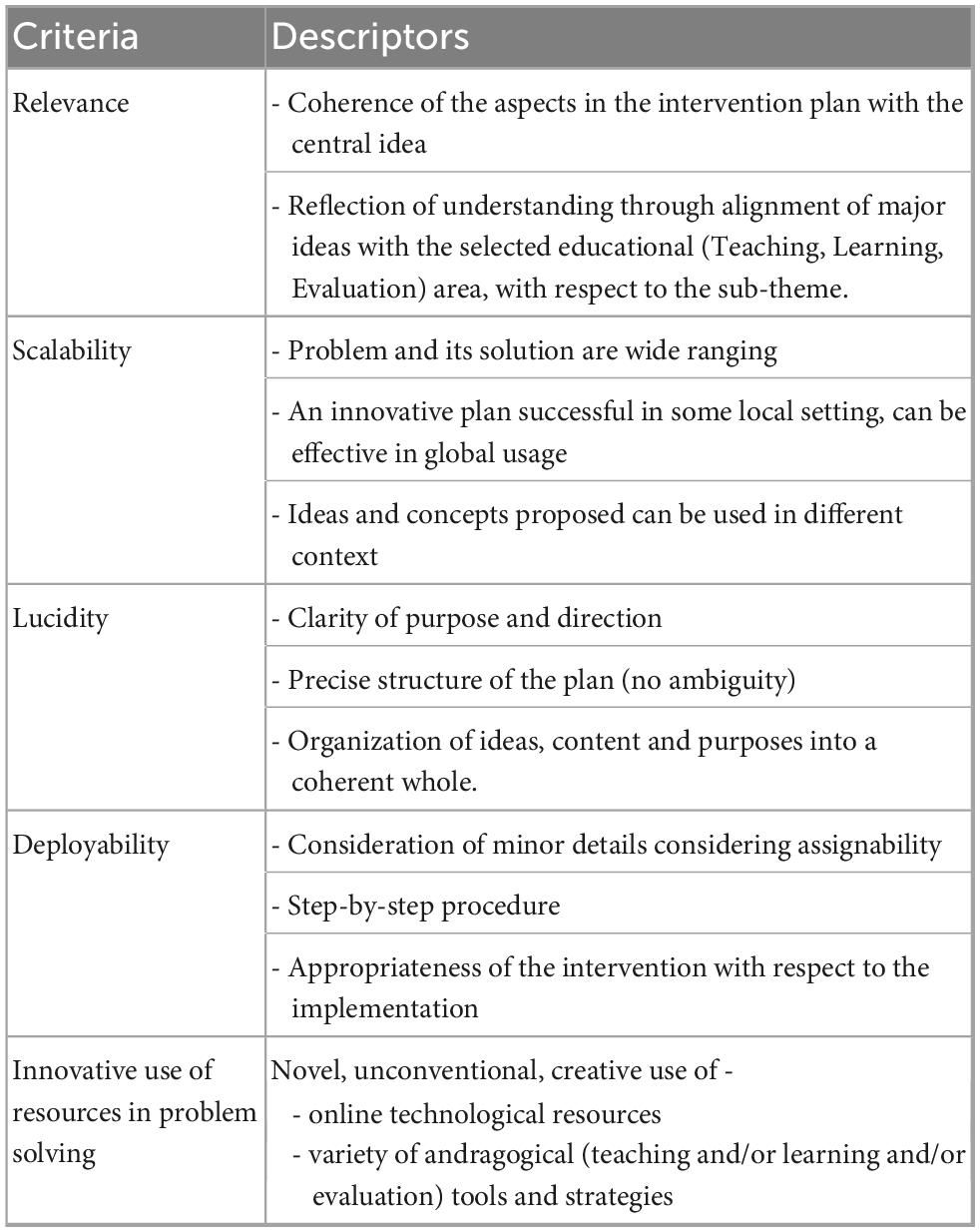
Table 4. TLE hackathon level 4 scrutiny: evaluation criteria for rubrics assessing content of the intervention.
The evaluation rubric used for the delivery or presentation of the intervention before the jury in this round included following criteria (Table 5).
The 4—point scale was used for both the rubrics and scores were obtained for content and presentation of the intervention (Maximum score–20, each). The final scores obtained from both the evaluations were considered for the selection of winning teams.
2.7.2.4 Self-evaluation checklist used in level 2 submission
For level 2 of the T-L-E Hackathon one more tool was used to verify completeness of the submission in the form of self-evaluation checklist to be filled in by the participants after verifying that all the essential elements were included in the submission. The checklist is presented in Table 6.
2.7.2.5 Feedback form
Feedback regarding overall experience for this Teaching- Learning- Evaluation Hackathon was collected using a 4-point scale ranging from “Excellent” to “Bad.”
2.7.3 Validation of instruments
The validity of all the rubrics developed for evaluating teaching interventions was established through expert review for content alignment, face validation by experienced educators for clarity and relevance, and pilot testing with in-house faculty to ensure practical applicability and consistency in scoring.
2.7.4 Analytic procedures
• For all three rubrics 4-point scale was used. The interpretation matrix was used by the evaluators for evaluating the submission and/or performance of the individual or teams, is as follows -
- 4- Excellent (Exceeds expectations, demonstrates innovation, completeness and high quality)
- 3- Good (Meets expectations, performance as expected with minor lapses)
- 2- Satisfactory (Partially meets expectations, noticeable gaps or inconsistencies)
- 1- Needs Improvement (Below expectations of the basic standards, lacks clarity, completeness)
Rubric scores were compiled to evaluate team performance at each round.
• The hackathon was conducted in three rounds, with team performance evaluated in each round using a structured 4-point scale rubric. In each round, teams were scored independently by a panel of expert evaluators. The scores from all criteria were totaled to derive an overall team score per round. These cumulative scores were used to shortlist teams for subsequent rounds, ensuring a merit-based and transparent selection process. Teams with the highest aggregate scores progressed to the next round (Round 2 and 3) except Round 1. In Round 1 the scores were calculated for each team but all teams were encouraged to participate in the next round (Round 2) and there was no elimination. Round 1 and Round 2 scores were combined, and aggregate scores were obtained for the teams, for selection in the final round. For Round 3, the final teams were selected based on their rubric scores.
• Quantitative data from survey were analyzed using percentage analysis to assess overall participant satisfaction and learning outcomes. The data were analyzed using percentage analysis to determine the distribution of responses providing an overview of participants’ perceptions of the TLE Hackathon experience, using the following interpretation matrix (Table 7).
• No qualitative coding was performed, as no open-ended textual data were collected.

Table 7. Interpretation matrix for analyzing the feedback on learning experiences in the TLE hackathon.
3 Results, contributions and educational implications
This section presents the results derived from the rubric assessments, participant submissions, and feedback survey data.
3.1 Application of andragogy principles
Through the application of andragogy principles, the T-L-E Hackathon provided a highly engaging, relevant, and effective learning experience to the participating teachers, resulting in collaborative problem-solving. The hackathon emphasized self-directed and self-motivated learning, reinforcing the role of educators as active problem solvers. In this context, andragogy transformed the hackathon into a professional networking activity, empowering teachers to address real challenges in education and propose impactful, practical solutions.
In the problem-solution intervention developed by the participating teams, each of the component is rooted in andragogical principles, highlighting relevance, self-direction, experiential learning, critical reflection, and problem-centered design. The structure empowered faculty to co-create meaningful, context-specific teaching-learning solutions through an adult learning lens as presented in Table 8.
3.2 Multidisciplinary collaborations
The T-L-E Hackathon brought together educators from various domains, encouraging the exchange of knowledge and experiences to identify common challenges across disciplines. This cross-pollination of ideas facilitated the development of feasible solutions that can be applied across different subject areas, promoting further collaborations and broadening perspectives within the educational community.
3.3 Reforming instructional design
The solutions generated through the hackathon enabled educators to rethink and reform conventional teaching, learning, and evaluation practices. The newly developed interventions help address instructional challenges, support learner engagement, and contribute to enhancing the academic achievement of students.
3.4 Scalability
The collaborative solutions developed during the hackathon are scalable and adaptable, allowing for their application to a variety of educational problems in different contexts. The flexibility enhances the potential for wider adoption of proposed interventions across educational institutions.
3.5 Empowering educators
The sense of belonging to the teaching community fostered by the hackathon empowered educators to take ownership of change in their professional practices. This sense of agency encouraged teachers to become change-makers, actively contributing to the improvement of teaching, learning, and evaluation practices for the common good.
3.6 Promoting equity
By addressing real-world educational challenges, the T-L-E hackathon promoted equitable opportunities for participation, without restrictions based on discipline, subject, gender, teaching experience, position (ad hoc or permanent), or type of institution (public/private, aided/unaided). This inclusive approach enhanced accessibility and promoted equity within the teaching community. Importantly, this model aligns with the objectives of the United Nations Sustainable Development Goal 4 (SDG 4): Quality Education, which emphasizes inclusive and equitable quality education and the promotion of lifelong learning opportunities for all.
3.7 Enhanced learning
When organized for teachers, the T-L-E Hackathons support the improvement of teaching practices, learning methods, and evaluation tools, ultimately enhancing student learning outcomes. Similarly, if such hackathons are conducted for students, they can foster greater engagement, encourage the application of knowledge and skills, and promote creative thinking and problem-solving, leading to meaningful learning advancement.
3.8 Effective technology integration
Designed as an online event, the T-L-E hackathon leveraged virtual platforms to facilitate group formation, discussions, information sharing, planning, and presentations. This virtual environment enabled teachers to collaborate across geographical boundaries and utilize a range of digital tools for problem-solving. This approach removed logistical barriers and promoted ease of communication and collaboration.
3.9 Innovative approach for professional development
The T-L-E Hackathon offered a hands-on, collaborative alternative to traditional development programs, emphasizing active engagement and peer-driven problem-solving.
3.10 Building a community of practice
The collective problem-solving experience gained through the hackathon motivated teachers to consider building communities of practice beyond the event itself. These supportive networks have the potential to extend into long-term professional collaborations and shared learning experiences in the future.
These contributions highlight the potential of hackathons as transformative tools in higher education, setting the stage for further discussion and reflection on their broader implications.
4 Discussion
The T-L-E Hackathon aligns closely with Knowles’ andragogical principles, emphasizing self-directed learning, experiential knowledge, and real-life problem-solving. Its open-ended, problem-solution based format empowered faculty as active, self-motivated participants tackling authentic teaching, learning, and evaluation issues. As such, it functioned as a learner-centered, practice-driven model of faculty development grounded in adult learning theory. The hackathon also has relevance with the Heutagogy principle fostering learner agency (Hase and Blaschke, 2021). Furthermore, the T-L-E Hackathon complements andragogical principles with Kolb’s experiential learning cycle, enabling participants to learn through hands-on engagement and reflective practice. This approach aligns with previous research highlighting the value of gaining concrete experience during collaboration and reflecting on those experiences to generate innovative and feasible solutions to identified challenges (Fewster-Thuente and Batteson, 2018). It also fosters a community of practice, where participants collaboratively construct knowledge, share experiences, and co-develop solutions to real-world educational challenges.
Adult learning through the lens of Self-determination theory supports autonomous motivation, stating that humans experience enhanced well-being, and are most motivated when their need for autonomy, competence, and relatedness are fulfilled. When the motivation is intrinsic people display higher level of interest and perform better (Ryan and Deci, 2024). The Hackathon’s structure empowered faculty participants with choice and agency in identifying and addressing educational challenges, thus nurturing motivation and autonomy. In parallel the social and collaborative aspects of faculty learning in the Hackathon is promoting the essence of co-construction of knowledge and joint problem solving as proposed by the Collaborative Learning Theory (Yang et al., 2024), especially in the context of Computer-Supported Collaborative Learning (Dillenbourg et al., 2009) and networked learning (Dohn et al., 2018) during the 24-h of hackathon activities. This hackathon integrated technology-enabled learning approaches, using Zoom as a collaborative platform. As such, it is transforming adult learning in directions that go beyond Knowles’ initial model.
These theoretical perspectives establish the T-L-E Hackathon as a holistic faculty development experience grounded in motivation, social learning, problem solving and practice-based inquiry. Realizing the cross-cultural/contextual variation participants can bring in, the hackathon encouraged the use of context-specific problems rooted in participants’ locally relevant teaching realities. This contest thus encouraged not top-down approach involving all, irrespective of their discipline, type of institution, and teaching experience, minimizing power imbalances.
Teachers and learners face numerous challenges throughout educational processes and transactions. The T-L-E Hackathon was conducted as a problem-solving initiative focused on improving instructional techniques, learning activities, and assessment practices, with the goal of enhancing the quality of education and achieving intended learning outcomes. Unlike professional conferences and seminars, educational hackathons offer a platform not only for discussing challenges but also for working collaboratively to develop authentic, immediately applicable solutions. The T-L-E Hackathon, in particular, emphasized educational reforms and their long-term implications, setting it apart from traditional technology-focused hackathons, which primarily aim to produce technological solutions.
The T-L-E Hackathon, as detailed in this case study, confirms the potential of educational hackathons as effective tools for collaborative problem-solving and professional development in higher education. Its 24-h, virtual format enabled interdisciplinary teams of educators to co-create practical solutions to teaching-learning-evaluation (T-L-E) challenges—reflecting the expanding use of hackathons across diverse fields (Garcia, 2023). Grounded in andragogical principles, the event engaged faculty as adult learners in a structured, time-bound environment, supporting earlier findings on the benefits of challenge-based learning and collaborative innovation (Mwangi et al., 2021; Vilariño and Serra-Ruiz, 2021). This model offers a replicable approach for fostering educator-led innovation and addressing common educational concerns across disciplines.
A collective intelligence hackathon focusing on global water quality challenges was organized by UN agencies and the European Commission, brought together interdisciplinary participants to co-create innovative solutions for water monitoring (Chernov et al., 2024). A hackathon in food and nutrition was conducted, specifically focusing on leveraging open data in this sector to drive business innovation (Tucci et al., 2018). Steglich et al. (2021) conducted an online educational hackathon focused on skill development and professional collaboration among engineering students through a structured 30-h event aimed at solving societal problems. One more innovative hackathon was administered by Schulten et al. (2022) aimed to foster innovation, learning, community-building, and to address civic and environmental challenges through collaborative, time-bound problem-solving. This approach provides new insights into team dynamics and communication patterns.
Suominen et al. (2018) conducted an educational hackathon as an innovative pedagogy within higher education institutes in Finland, covered a detailed process for hackathon conduction, brainstorming models, developmental suggestions offered by student participants. This approach is aligned with the present study’s offering of a structured process for designing and delivering hackathons, specifically for teachers. Hackathons can be used as innovative educational tools by integrating learning objectives, providing guidance, and aligning them with curricular goals to enhance student engagement and skill development (Chounta et al., 2023). The study by Hershkovitz and Lahav (2023) highlighted the hackathon’s contribution to recognize the importance of collaboration and strengthening the academy-society relationship, which also reflects the andragogical approach adopted in the present study. A recent study Vanhée et al. (2024) on the EDUCHIC Hackathon further demonstrated the potential of hackathons in solving interdisciplinary challenges by integrating pedagogical and organizational processes. Their work aligns with the T-L-E Hackathon in its focus on interdisciplinary collaboration, though the present study distinctly emphasizes the use of andragogical principles for addressing challenges in teaching, learning, and evaluation among higher education teachers.
Despite several research efforts in this area, the T-L-E Hackathon stands out as a unique model that systematically applies an andragogical approach to engage adults, specifically teachers, in resolving professional challenges related to teaching, learning, and evaluation practices. By providing a structured, collaborative, and solution-oriented platform, the T-L-E Hackathon contributes meaningfully to the growing body of research on educational hackathons and their role in fostering innovation and professional development in higher education.
In order to further clarify the distinct characteristics of the T-L-E Hackathon in comparison to conventional coding or technological hackathons, Table 9 presents a summary of the key differences between these two models.

Table 9. Comparison between educational hackathons (T-L-E) and conventional technological hackathons.
Recent literature highlights the growing interest in hackathons as tools for innovation and skill development in educational contexts. However, most existing studies, such as those by Resch et al. (2025), Miličević et al. (2024), Holmen et al. (2024), and Mehta et al. (2022), primarily focus on students, pre-service teachers, or mixed audiences, often in technical or skill-building scenarios. These studies present valuable insights but tend to emphasize short-term outcomes, exploratory learning, and product-oriented goals, with limited grounding in adult learning theories or structured frameworks for replication.
In contrast, the T-L-E Hackathon positions itself uniquely by targeting in-service higher education faculty across disciplines and institutions, with a well-defined roadmap built on andragogical principles. It offers a comprehensive three-phase blueprint, planning, execution, and evaluation, operationalized through team autonomy, context-sensitive problem-solving, and robust evaluation mechanisms. Unlike prior work, our approach explicitly maps adult learning constructs to each phase, includes structured instruments for feedback and assessment, and links the initiative to global educational goals (SDG 4). This systematic and replicable model adds novel value to the discourse on faculty development and instructional innovation in higher education. The comparison of the T-L-E Hackathon with the existing hackathon models is presented in Table 10.
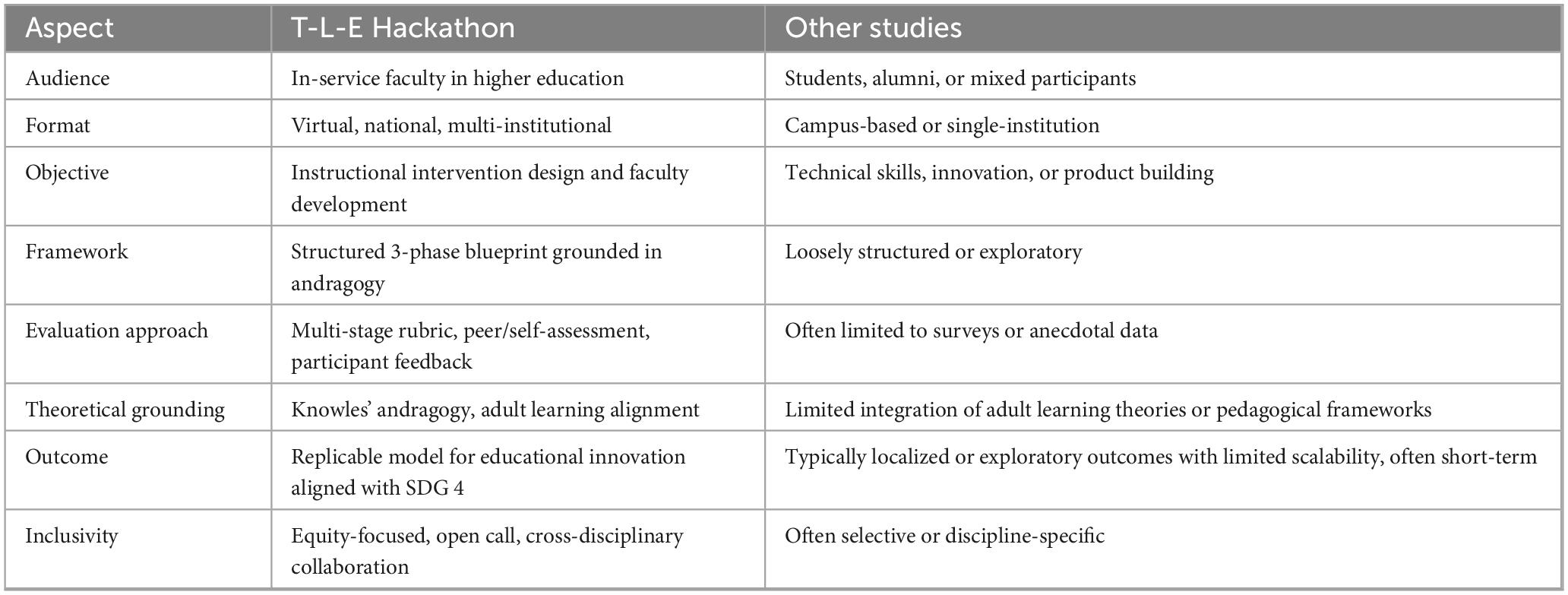
Table 10. Comparison of the T-L-E hackathon framework with existing faculty-centered hackathon models.
5 Novelty
This paper introduces the Teaching-Learning-Evaluation (T-L-E) Hackathon as a pioneering model for academic innovation—an underexplored concept in the field of higher education. Unlike conventional professional development formats, the T-L-E Hackathon offers a co-designed, inquiry-driven virtual initiative specifically designed for educators to address real-world educational challenges through practical and innovative solutions.
The novelty of this approach lies in the following key aspects:
- Introducing a unique concept: The T-L-E Hackathon represents a first-of-its-kind initiative that brings educators together in a competitive yet collaborative setting to propose and design innovative interventions targeting teaching, learning, and evaluation practices.
- Providing a blueprint for implementation: This paper offers a comprehensive, replicable blueprint for educational institutions, outlining the structured implementation and robust evaluation process of the hackathon. This structured approach serves as a practical guide for adaptation and adoption across various contexts.
- Promoting multi-stakeholder engagement: The model emphasizes inclusivity and scalability, allowing its adoption at different levels—from institutional events to national and global competitions—while encouraging participation from diverse academic disciplines and backgrounds.
- Focusing on innovation and creativity: By integrating technology, creativity, and collaborative problem-solving, the hackathon model fosters agile, learner-centered, and innovative andragogical practices. It seeks to shift the educational paradigm toward more responsive and adaptable instruction and evaluation strategies.
- Demonstrating dual utility: Although primarily developed for educators, the T-L-E Hackathon also highlights the potential for student engagement, positioning educational hackathons as dynamic platforms for enhancing student learning through experiential, collaborative activities as it is based on andragogy. With further research the potential of using the T-L-E Hackathon to resolve learner and learning related challenges can be explored.
This contribution advances the discourse on educational innovation by positioning the hackathon methodology not merely as a technological or entrepreneurial tool, but as a strategic pedagogical model capable of supporting faculty development, instructional design reform, and cross-disciplinary collaboration.
6 Limitations
This case study presents a detailed roadmap for organizing a unique hackathon model designed specifically for teachers to address educational challenges. However, the scope of the study was intentionally limited to the processes and practices involved in conducting the hackathon for educators within the higher education sector, focusing solely on issues related to teaching, learning and evaluation. Other critical areas of educational concern, such as curriculum reforms, policy implementation, and professional development issues, were beyond the scope of this initiative and were not considered within the problem-solving framework of the hackathon. This study was conducted on teachers in higher education and not the learners.
While the study drew on structured feedback and rubric-based evaluations to assess the hackathon experience, it did not incorporate rich qualitative narratives from participants through interviews or open-ended reflections. Future iterations could benefit from integrating deeper qualitative data to capture participants’ learning journeys, challenges encountered, and perceived impact in their own words, which would enhance the depth of understanding regarding the intervention’s outcomes. Future research may also consider applying this model to more specific educator profiles (e.g., novice faculty, STEM instructors) to allow deeper analysis of learning outcomes within more narrowly defined groups, and to mitigate the complexity introduced by the interdisciplinary nature of participation, which can make it difficult to assess learning and growth in a consistent manner.
7 Conclusion
This case study outlines a practical roadmap for conducting educational hackathons in a virtual format, specifically designed to facilitate problem-solving in the areas of teaching, learning and evaluation. The success of this unique event confirms that such educational hackathons are not only needed but are also valued by stakeholders within the higher education sector. Rooted in adult learning principles, the T-L-E Hackathon addressed the unique needs of higher education faculty through a collaborative, solution-oriented format.
In conclusion, this case demonstrates that hackathons can serve as a method for engaging educators, and potentially learners, in designing intervention plans to address real-world problems related to teaching, learning and evaluation. This case study offers a practical blueprint and step-by-step guide for future organizers interested in adopting similar models for educational innovation.
As a next step, we recommend integrating the T-L-E Hackathon model into institutional faculty development and exploring its adaptation for interdisciplinary teams, including student participants. Additionally, comparative studies examining virtual versus in-person hackathons, as well as the development of frameworks to assess solution effectiveness, would further strengthen this emerging field. Further research is recommended to explore the modeling of hackathon processes with education, with the aim of enhancing productivity, creativity, and problem-solving skills among both teachers and learners. For continuous improvement and wider impact, we encourage the organization of T-L-E Hackathons across higher education institutions, actively involving all stakeholders in the pursuit of meaningful and effective solutions. Additionally, this model aligns with the global objectives of the United Nations Sustainable Development Goal 4 (SDG 4): Quality Education, by promoting inclusive, equitable, and innovative learning environments that support lifelong learning opportunities for all.
Data availability statement
The datasets generated during and/or analyzed during the current study, presented as a case, are available from the corresponding author on reasonable request.
Ethics statement
Ethical review and approval was not required for the study on human participants in accordance with the local legislation and institutional requirements. All responses were collected with informed written consent.
Author contributions
SG: Conceptualization, Investigation, Methodology, Project administration, Resources, Supervision, Visualization, Writing – original draft, Writing – review & editing. AW: Conceptualization, Data curation, Formal Analysis, Investigation, Methodology, Visualization, Writing – original draft, Writing – review & editing. FD: Data curation, Methodology, Resources, Software, Supervision, Visualization, Writing – original draft, Writing – review & editing.
Funding
The author(s) declare that no financial support was received for the research and/or publication of this article.
Acknowledgments
The authors would like to express their sincere gratitude to all the participants and experts who willingly took part in the T-L-E Hackathon. Their time and valuable contributions were instrumental in the success of this initiative. The authors confirm that they have read and approved the final version of the manuscript. The declare that there are no conflicts of interest associated with this work. The authors also certify that this submission is original, and has not been published previously, and is not under consideration for publication elsewhere.
Conflict of interest
The authors declare that the research was conducted in the absence of any commercial or financial relationships that could be construed as a potential conflict of interest.
Generative AI statement
The authors declare that Generative AI was used in the creation of this manuscript. Generative AI was used In the preparation of this manuscript, generative AI tools (ChatGPT) were used solely for language editing and improving readability. The authors reviewed and verified all content to ensure its accuracy and integrity.
Publisher’s note
All claims expressed in this article are solely those of the authors and do not necessarily represent those of their affiliated organizations, or those of the publisher, the editors and the reviewers. Any product that may be evaluated in this article, or claim that may be made by its manufacturer, is not guaranteed or endorsed by the publisher.
References
Avila-Merino, A. (2019). Learning by doing in business education: Using hackathons to improve the teaching and learning of entrepreneurial skills. J. Entrep. Educ. 22, 1–18.
Bolton, W. S., Ng, S., Lam, A., Kinch, J., Parchment, V., Foster, W. P., et al. (2020). Virtual hackathon to tackle COVID-19 unmet needs. BMJ Innov. 7, 284–287. doi: 10.1136/bmjinnov-2020-000456
Braune, K., Rojas, P. D., Hofferbert, J., Valera Sosa, A., Lebedev, A., Balzer, F., et al. (2021). Interdisciplinary online hackathons as an approach to combat the COVID-19 pandemic: Case study. J. Med. Internet Res. 23:e25283. doi: 10.2196/25283
Brown, A., Jauregui, J., Chipman, A. K., and Ilgen, J. S. (2018). Using hackathons to transform complex educational problems into innovative prototypes. J. Grad. Med. Educ. 10, 465–466. doi: 10.4300/JGME-D-18-00395.1
Calco, M., and Veeck, A. (2015). The Markathon: Adapting the hackathon model for an introductory marketing class project. Mark. Educ. Rev. 25, 33–38. doi: 10.1080/10528008.2015.999600
Chernov, I., Elsler, M., Maillart, T., Cacciatori, C., Tavazzi, S., Gawlik, B. M., et al. (2024). Innovative solutions for global water quality challenges: Insights from a collaborative hackathon event. Front. Water 6:1363116. doi: 10.3389/frwa.2024.1363116
Chounta, I. A., Hoppe, H. U., Nolte, A., and Spikol, D. (2023). Re-inventing project-based learning: Hackathons, datathons, devcamps as learning expeditions. Front. Educ. 8:1182264. doi: 10.3389/feduc.2023.1182264
Dillenbourg, P., Járvelä, S., and Fischer, F. (2009). “The evolution of research on computer-supported collaborative learning,” in Technology-Enhanced Learning, eds N. Balacheff, S. Ludvigsen, T. de Jong, A. Lazonder, and S. Barnes (New York City, NY: Springer), 3–19. doi: 10.1007/978-1-4020-9827-7_1
Dohn, N. B., Sime, J.-A., Cranmer, S., Ryberg, T., and De Laat, M. (2018). “Reflections and challenges in networked learning,” in Networked Learning: Reflections and Challenges, eds N. B. Dohn, S. Cranmer, J.-A. Sime, T. Ryberg, and M. De Laat (New York City, NY: Springer), 187–212. doi: 10.1007/978-3-319-01940-6_2
Duhring, J. (2014). “Project-based learning kickstart tips: Hackathon pedagogies as educational technology,” in VentureWell. Proceedings of Open, the Annual Conference, (National Collegiate Inventors & Innovators Alliance), 1.
Fewster-Thuente, L., and Batteson, T. J. (2018). Kolb’s experiential learning theory as a theoretical underpinning for interprofessional education. J. Allied Health 47, 3–8.
Gama, K., Alencar Gonçalves, B., and Alessio, P. (2018). “Hackathons in the formal learning process,” in Proceedings of the 23rd Annual ACM Conference on Innovation and Technology in Computer Science Education, (ACM), 248–253. doi: 10.1186/s13023-022-02558-5
Gama, K., Zimmerle, C., and Rossi, P. (2021). “Online hackathons as an engaging tool to promote group work in emergency remote learning,” in Proceedings of the 26th ACM Conference on Innovation and Technology in Computer Science Education, (ACM), 345–351.
Garcia, M. B. (2023). Fostering an innovation culture in the education sector: A scoping review and bibliometric analysis of hackathon research. Innov. High. Educ. 48, 739–762. doi: 10.1007/s10755-023-09651-y
Hershkovitz, A., and Lahav, O. (2023). Promoting innovation via a university-organized online hackathon. Int. J. Teach. Learn. High. Educ. 35, 32–43.
Holmen, J. K., Powell, J. A., Nolte, A., MacCarthy, E., Dey, C., Vergara Larrea, V. G., et al. (2024). “FacultyHack events: Faculty-focused hackathons for high-performance computing curriculum development,” in Proceedings of the 8th International Conference on Game Jams, Hackathons and Game Creation Events, (ACM), 67–71.
Kienzler, H., and Fontanesi, C. (2017). Learning through inquiry: A global health hackathon. Teach. High. Educ. 22, 129–142. doi: 10.1080/13562517.2016.1221805
Knowles, M. S. (1984). Theory of Andragogy: A Critique. In International Journal of Lifelong Education. Cambridge, MA: Taylor & Francis.
Lyons, R., Brown, M., and Donlon, E. (2021). Moving the hackathon online: Reimagining pedagogy for the digital age. Distance Educ. China 7, 1–18.
Mehta, N., Bist, S. S., and Shah, P. (2022). Hackathons: What do engineering educators think about it? High. Educ. Skills Work-Based Learn. 12, 983–1001. doi: 10.1108/HESWBL-03-2021-0064
Miličević, A., Despotović-Zrakić, M., Stojanović, D., Suvajžić, M., and Labus, A. (2024). Academic performance indicators for the hackathon learning approach–The case of the blockchain hackathon. J. Innov. Knowl. 9:100501. doi: 10.1016/j.jik.2024.100501
Monsef, S., Yarmohammadian, M., Javanmard, S., Yazdi, Y., and Amini-Rarani, M. (2021). The role of hackathon in education: Can hackathon improve health and medical education? J. Educ. Health Promot. 10:334. doi: 10.4103/jehp.jehp_1183_20
Mwangi, K. W., Mainye, N., Ouso, D. O., Esoh, K., Muraya, A. W., and Mwangi, C. K. (2021). Open science in Kenya: Where are we? Front. Res. Metr. Anal. 6:669675. doi: 10.3389/frma.2021.669675
Nandi, A., and Mandernach, M. (2016). “Hackathons as an informal learning platform,” in Proceedings of the 47th ACM Technology Symposium Computer. Science Education, (ACM), 346–351. doi: 10.1145/2839509.2844590
Olson, K. R., Walsh, M., Garg, P., Steel, A., Mehta, S., Data, S., et al. (2017). Health hackathons: Theatre or substance? A survey assessment of outcomes from healthcare-focused hackathons in three countries. BMJ Innov. 3, 37–44. doi: 10.1136/bmjinnov-2016-000147
Resch, K., Freudhofmayer, S., and Martínez-Usarralde, M. J. (2025). A promising methodology. Assessing the pedagogical value of hackathons. Active Learn. High. Educ. doi: 10.1177/14697874251330793 [Epub ahead of print].
Ryan, R. M., and Deci, E. L. (2024). “Self-determination theory,” in Encyclopedia of Quality of Life and well-being Research. New York City, NY: Springer International Publishing, 6229–6235. doi: 10.1007/978-3-031-17299-1_2630
Schulten, C., Nolte, A., Spikol, D., and Chounta, I. A. (2022). How do participants collaborate during an online hackathon? An empirical, quantitative study of communication traces. Front. Comput. Sci. 4:983164. doi: 10.3389/fcomp.2022.983164
Silver, J. K., Binder, D. S., Zubcevik, N., and Zafonte, R. D. (2016). Healthcare hackathons provide educational and innovation opportunities: A case study and best practice recommendations. J. Med. Syst. 40:177. doi: 10.1007/s10916-016-0532-3
Steglich, C., Marczak, S., Guerra, L., Trindade, C., Dutra, A., and Bacelo, A. (2021). “An online educational hackathon to foster professional skills and intense collaboration on software engineering students,” in Proceedings of the XXXV Brazilian Symposium on Software Engineering, (ACM), 388–397.
Steglich, C., Salerno, L., Fernandes, T., Marczak, S., Dutra, A., Bacelo, A. P., et al. (2020). “Hackathons as a pedagogical strategy to engage students to learn and to adopt software engineering practices,” in Proceedings of the XXXVI Brazilian Symposium on Software Engineering, (ACM), 670–679.
Suominen, A. H., Jussila, J., Lundell, T., Mikkola, M., and Aramo-Immonen, H. (2018). “Educational hackathon: Innovation contest for innovation pedagogy,” in ISPIM 2018: Proceedings of the ISPIM Innovation Conference Innovation, the name of the game. LUT Scientific and Expertise Publications: Reports, 78, eds. I. Bitran, S. Conn, K. R. E. Huizingh, O. Kokshagina, M. Torkkeli, and M. Tynnhammar (Lappeenranta University of Technology; ISPIM), 1–17. Available online at: https://ispim.lemonstand.com/product/educational_hackathon_innovation_contest_for_innovation_pedagogy
Tucci, C., Viscusi, G., and Gautschi, H. (2018). Translating science into business innovation: The case of open food and nutrition data hackathons. Front. Nutr. 5:96. doi: 10.3389/fnut.2018.00096
Vanhée, L., Danielsson, K., Enqvist, L., Grill, K., and Borit, M. (2024). Hack it with EDUCHIC! Educational hackathons and interdisciplinary challenges—Definitions, principles, and pedagogical guidelines. Eur. J. Educ. 59:e12658. doi: 10.1111/ejed.12658
Vilariño, F., and Serra-Ruiz, J. (2021). “Hackathon as a teaching methodology for challenge-based learning,” in Proceedings of the EDULEARN21, (IATED), 8123–8130.
Yang, S., Du, X., Tang, H., Hung, J. L., and Tang, Y. (2024). Temporal group interaction density in collaborative problem solving: Exploring group interactions with different time granularities. Educ. Inf. Technol. 29, 13271–13298. doi: 10.1007/s10639-023-12373-5
Keywords: educational hackathon, teaching learning evaluation, innovative interventions, technology integration, problem-solution plan, higher education, sustainable development goal, quality education
Citation: Gaikwad S, Wadegaonkar A and Dib FK (2025) Rewiring andragogy: the teaching-learning-evaluation (T-L-E) hackathon blueprint. Front. Educ. 10:1633267. doi: 10.3389/feduc.2025.1633267
Received: 22 May 2025; Accepted: 25 June 2025;
Published: 23 July 2025.
Edited by:
Paitoon Pimdee, King Mongkut’s Institute of Technology Ladkrabang, ThailandReviewed by:
Isabel María Gómez-Trigueros, University of Alicante, SpainJacinto Jardim, Universidade Aberta, Portugal
Nuno Fraga, University of Madeira, Portugal
Alison Torn, Leeds Trinity University, United Kingdom
Copyright © 2025 Gaikwad, Wadegaonkar and Dib. This is an open-access article distributed under the terms of the Creative Commons Attribution License (CC BY). The use, distribution or reproduction in other forums is permitted, provided the original author(s) and the copyright owner(s) are credited and that the original publication in this journal is cited, in accordance with accepted academic practice. No use, distribution or reproduction is permitted which does not comply with these terms.
*Correspondence: Ashwini Wadegaonkar, YXNod2luaS53YWRlZ2FvbmthckBzaXUuZWR1Lmlu
 Sophia Gaikwad
Sophia Gaikwad Ashwini Wadegaonkar
Ashwini Wadegaonkar Fadi K. Dib
Fadi K. Dib